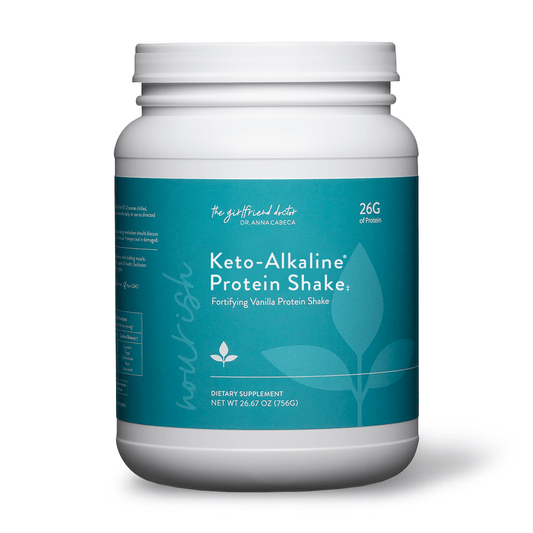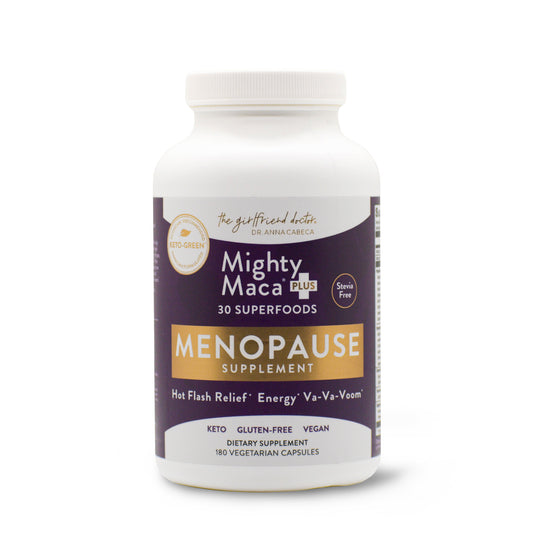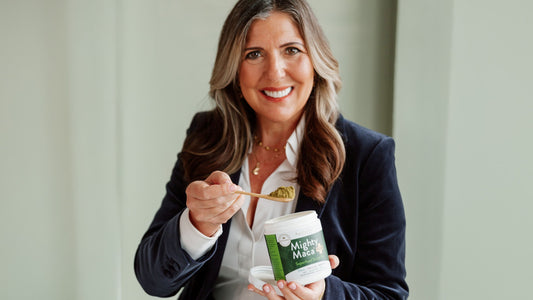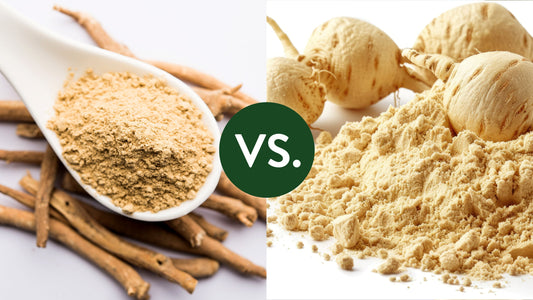“I’m becoming less of a woman.”
“I’m over the hill.”
“I’m going to suffer through every part of menopause.”
Sound familiar? Menopause stimulates negative self-talk, not to mention negative societal connotations. It’s a power-packed combo of physical challenges and mental stressors. It can be a difficult time, I know. But it doesn’t have to be.
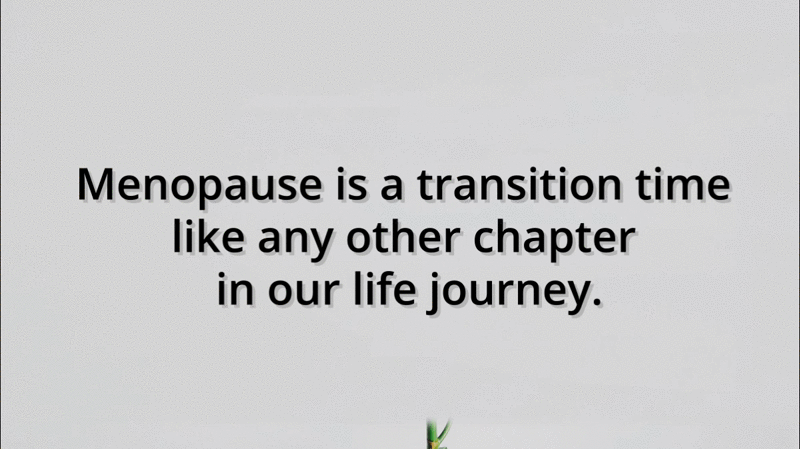 Many women head into menopause without knowing what is happening to their own bodies.
Many women head into menopause without knowing what is happening to their own bodies.
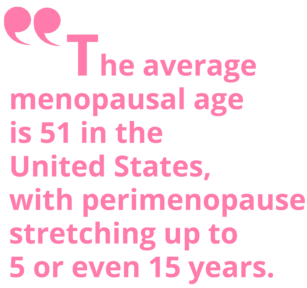 It’s as if everything that comes after menopause is just a bonus because our best lives have already been lived. I find this offensive to the wonderful, dynamic women in my life who are still living their best lives, even (gasp) after menopause.
It’s as if everything that comes after menopause is just a bonus because our best lives have already been lived. I find this offensive to the wonderful, dynamic women in my life who are still living their best lives, even (gasp) after menopause.
Menopause is a transitional time like any other chapter in our lives.
Since overcoming my own health challenges and menopausal journey, and treating thousands of women in theirs, I am as committed to my mission as ever, to creating a guide to living your best life through the transition. As for menopause? Let’s live it, let’s thrive in it
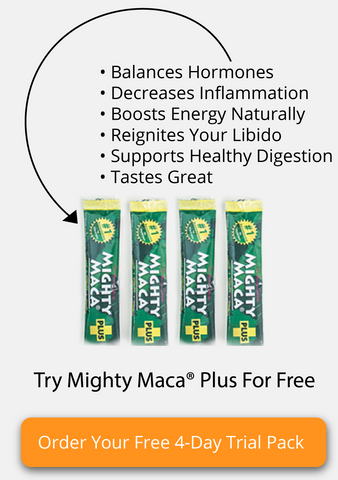 Let this be your step-by-step guide for your menopause journey.
Let this be your step-by-step guide for your menopause journey.
What Is Menopause?
To put it simply, menopause is the time of your life when you naturally stop having menstrual periods. It marks the end of our reproductive years. Since our periods can fluctuate during perimenopause (the phase when the ovaries start to produce less estrogen), you know you’ve truly hit menopause after you go 12 months without a period.
The average menopausal age is 51 in the United States, with perimenopause stretching up to 5 or even 15 years. Sometimes, perimenopause can start as young as our 30s.
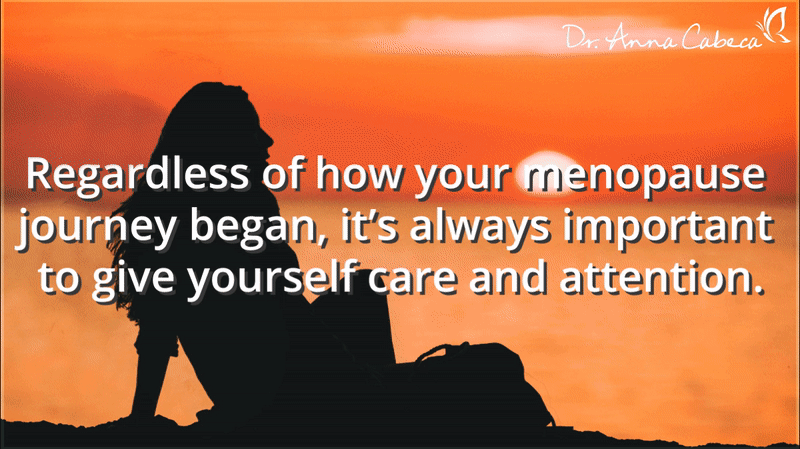 What Causes Menopause?
What Causes Menopause?
The most common reason for menopause is the natural decline of our reproductive hormones, estrogen, androgens, and progesterone.
These hormones help control the menstrual cycle, and as you approach your late 30s, your ovaries start making fewer of them. On average, around age 51, your ovaries stop producing eggs and you have no more periods.
Getting a hysterectomy that removes both your uterus and ovaries (total hysterectomy and bilateral oophorectomy) triggers immediate menopause. Changes and symptoms are reportedly more severe since the hormonal change occurs abruptly and not over several years.
Additionally, we know that the post-menopausal ovary still produces androgens such as testosterone and androstenedione, and serve a purpose in terms of hormonal balance.
Certain cancer therapies like chemotherapy and radiation therapy can also induce menopause. Clients have reported having hot flashes during and even after the treatment. In this case, the halt in menstruation isn’t always permanent, so it’s still possible to get pregnant.
And finally, around one percent of women under 40 might experience premature menopause (primary ovarian insufficiency). This happens when your ovaries fail to produce normal levels of reproductive hormones, triggering an early menopause response.
Regardless of how your menopause journey began, it’s always important to give yourself care and attention. Remember, you don’t have to suffer through your symptoms alone — or at all.
Be Aware: Potential Health Risks During Menopause
As if it isn’t enough that we’re trying to navigate the changes in our body (and mind) caused by menopause, the drop in estrogen production can also result in various health complications.
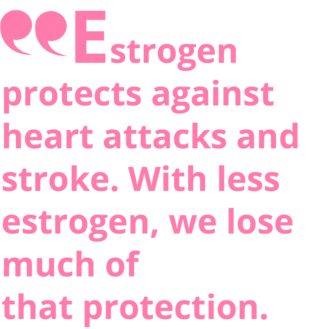 Estrogen protects against heart attacks and stroke. With less estrogen, we lose much of that protection. This causes women to be more at risk for heart diseases after menopause. This is also the time to keep a sharp eye out for your cholesterol and blood pressure levels.
Estrogen protects against heart attacks and stroke. With less estrogen, we lose much of that protection. This causes women to be more at risk for heart diseases after menopause. This is also the time to keep a sharp eye out for your cholesterol and blood pressure levels.
Estrogen replacement early on during the “estrogen window” (a phase of early menopause) can lower a woman’s risk of breast cancer, dementia, and heart disease, according to Dr. Mache Seibel’s book, The Estrogen Window,
After age 35, it’s natural that we experience a small amount of bone loss. However, the first four to eight years after menopause can cause rapid bone loss, increasing the risk of osteoporosis and bone fractures. Our hips, wrists, and spines are most often affected by this.
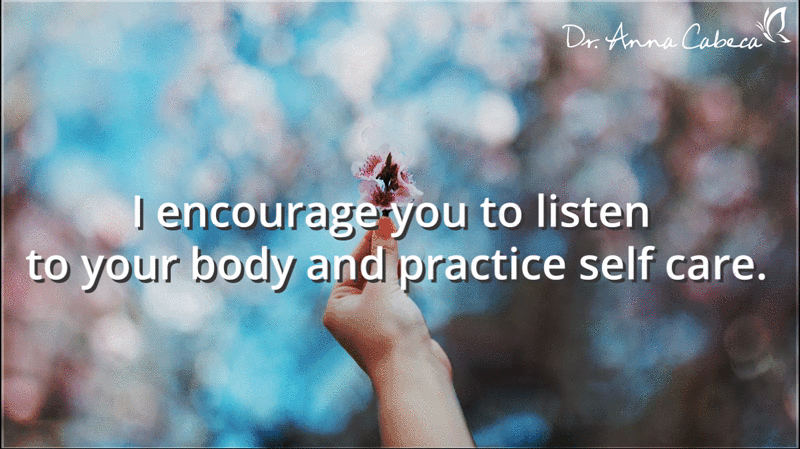 Know Them: Symptoms Of Menopause
Know Them: Symptoms Of Menopause
Along with irregular periods, perimenopause (and menopause) can also result in a host of different symptoms that we experience. Below are the nine most common symptoms menopausal women experience:
- Hot flashes
- Sleep disturbances
- Weight gain
- Decreased libido
- Vaginal dryness
- Incontinence
- Fatigue and overwhelm
- Brain fog
- Hormone imbalance
There is no one way to go through menopause. Some women might sail through without any symptoms, while others might experience one or a mix of the symptoms mentioned above.
Hot Flashes
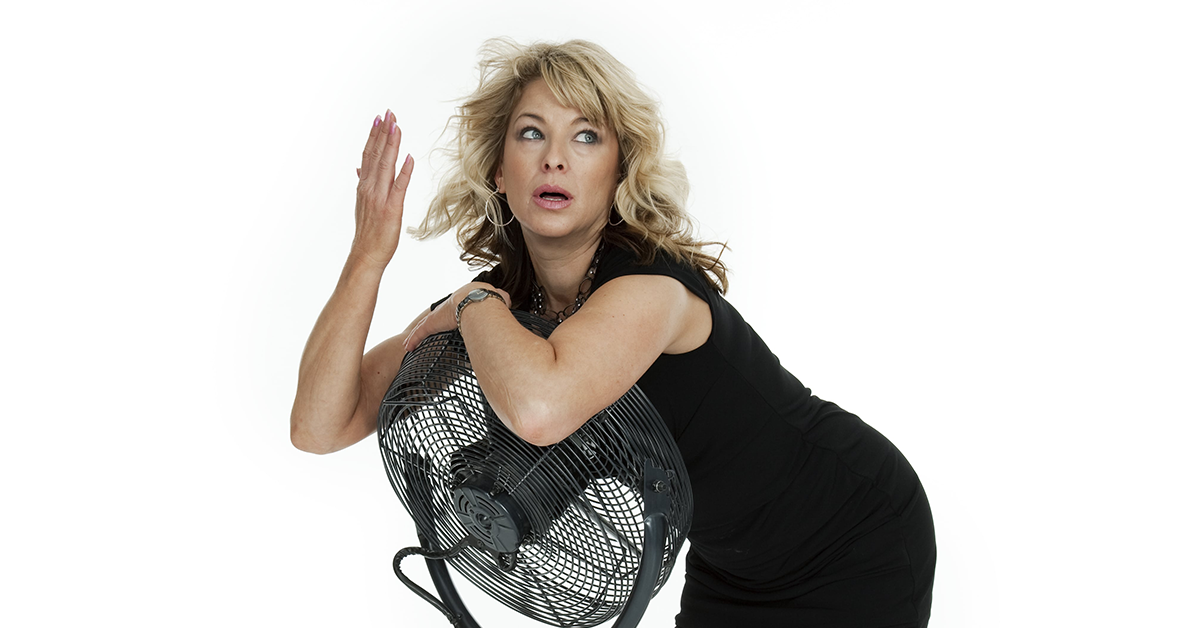 Hot flashes typically go away at some point. But that still leaves at least a couple of years to experience them (if you’re lucky). A hot flash can last between 5 and 30 minutes (sometimes longer). You feel an intense heat beginning in the head and neck region, you might start sweating, your heart races — it can be an intense experience.
Hot flashes typically go away at some point. But that still leaves at least a couple of years to experience them (if you’re lucky). A hot flash can last between 5 and 30 minutes (sometimes longer). You feel an intense heat beginning in the head and neck region, you might start sweating, your heart races — it can be an intense experience.
There is no one trigger for hot flashes. Common triggers include caffeine, alcohol, and smoking. Keep a journal. Figure out what your trigger is, and avoid it if you can, to eliminate those hot flashes (yes, relief is possible!).
To learn more about overcoming hot flashes naturally, read: A Keto-Green™ Diet Will Help You Naturally Cool Off (From Hot Flashes).
Sleep Disturbances
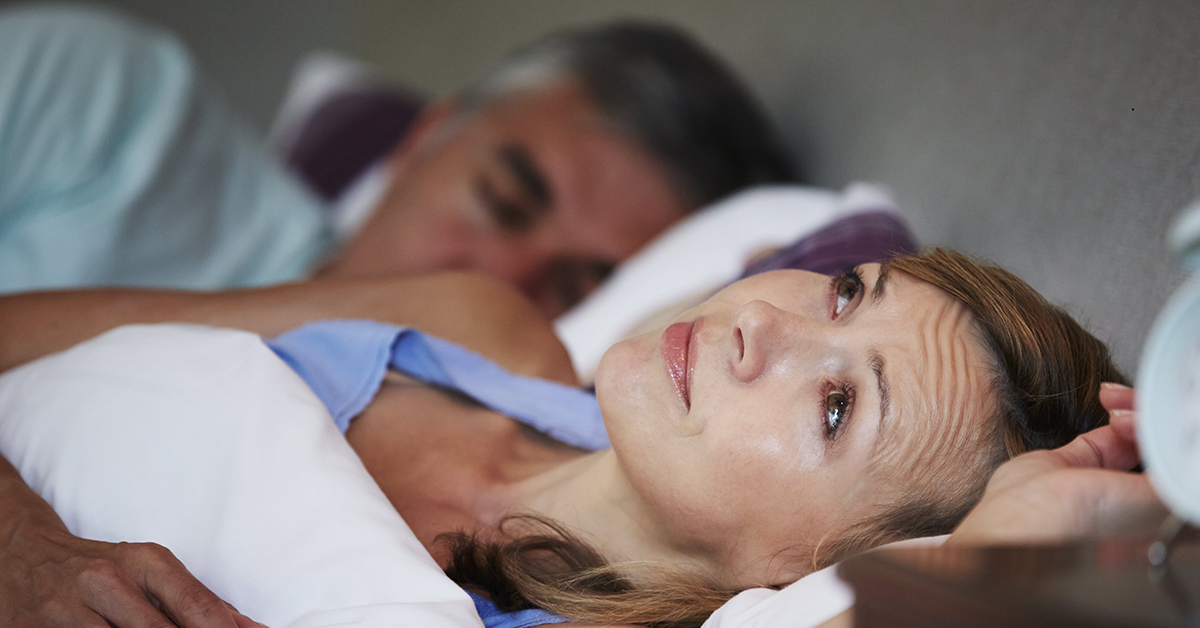 Experiencing the dread of insomnia can get miserable – and impact your overall health. Ironically, menopause is the time you should get as much quality sleep as you can. But all the hormone disruptions in your body can prevent complete rest. I have recently started using a music system called Wholetones, which uses ancient instrumentals to lull me to sleep.
Experiencing the dread of insomnia can get miserable – and impact your overall health. Ironically, menopause is the time you should get as much quality sleep as you can. But all the hormone disruptions in your body can prevent complete rest. I have recently started using a music system called Wholetones, which uses ancient instrumentals to lull me to sleep.
To learn more about getting better sleep, read: The Health Benefit Of Seeing Sunrises And Sunsets! Sleep Better.
Weight Gain
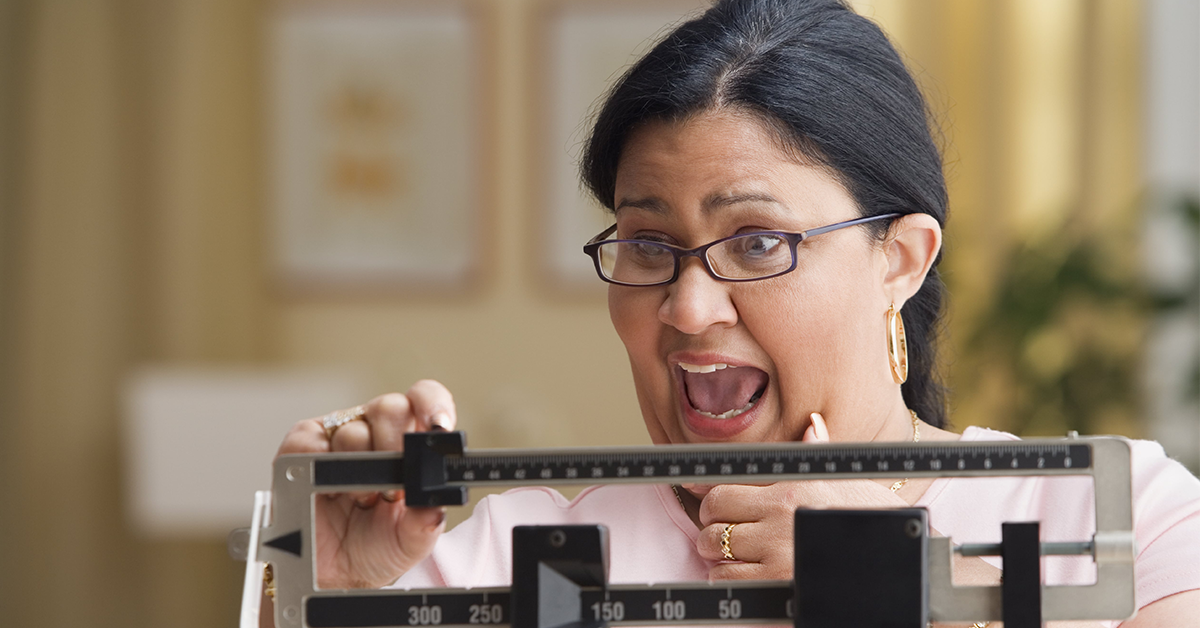 “Nothing else has changed but the scale keeps going up.”
“Nothing else has changed but the scale keeps going up.”
If you told me this when I was a much younger doctor, I honestly (and immaturely) would’ve thought, “Yeah? Sure.”
However, when I kept hearing this over and over and experienced it myself, that was another story! Unfortunately weight gain during this time of our lives is common. But it’s not unbeatable.
You might see fat gather around the belly area during menopause — yes, the dreaded muffin top! Our bodies go through metabolic changes, so the old methods that used to keep us trim and in shape might not work as well, or at all.
To learn how to overcome menopausal weight gain and regain control, read: From Apple To Hourglass — Beating Menopausal Weight Gain.
Decreased Libido
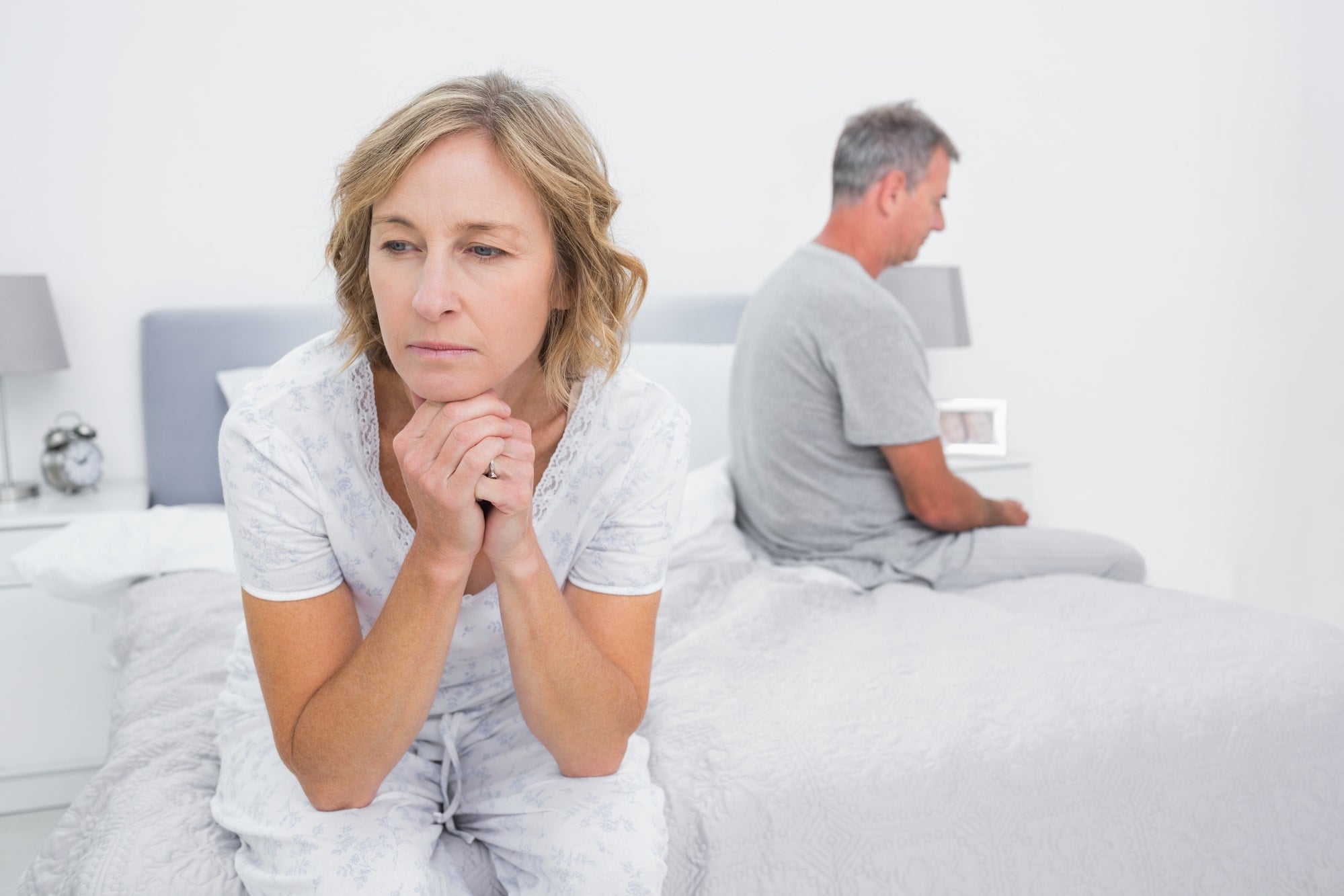 I understand the frustration many people feel over the loss of libido, loss of passion, the feelings of loneliness from lack of connection, and perhaps even guilt and shame for not wanting or being able to have sex.
I understand the frustration many people feel over the loss of libido, loss of passion, the feelings of loneliness from lack of connection, and perhaps even guilt and shame for not wanting or being able to have sex.
Remember, this does not mean that you don’t love and care for your partner.
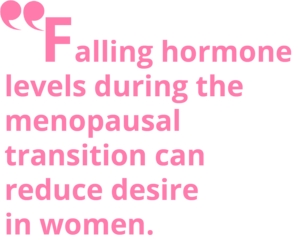 Falling hormone levels during the menopausal transition can reduce desire in women. It is absolutely possible to increase your desire, get more arousal, and climax during sex at any stage of your life. I can’t stress this enough.
Falling hormone levels during the menopausal transition can reduce desire in women. It is absolutely possible to increase your desire, get more arousal, and climax during sex at any stage of your life. I can’t stress this enough.
If sex hurts or causes discomfort, read: 3 Tips To Bring Passion Back Into A Sexless Marriage (Part 1).
If you feel a lack of communication and connection, read: 3 More Tips To Bring Passion Into A Sexless Marriage (Part 2).
Vaginal Dryness
 One of the most common symptoms to affect menopausal women is vaginal dryness, though it can affect women in their 20s and 30s as well. Vaginal dryness during menopause is caused by, you guessed it, hormone changes!
One of the most common symptoms to affect menopausal women is vaginal dryness, though it can affect women in their 20s and 30s as well. Vaginal dryness during menopause is caused by, you guessed it, hormone changes!
Vaginal dryness can affect your quality of life, your mental state and can cause physical pain for some. It also can cause more infections, odors, itching and irritations, incontinence, and decreased desire.
Many women suffer through vaginal dryness in silence, although there are solutions to heal your dryness – which does not go away with time.
To learn about healing vaginal dryness naturally, read: 5 Natural, Gynecologist Approved, Proven Solutions For Vaginal Dryness.
Incontinence
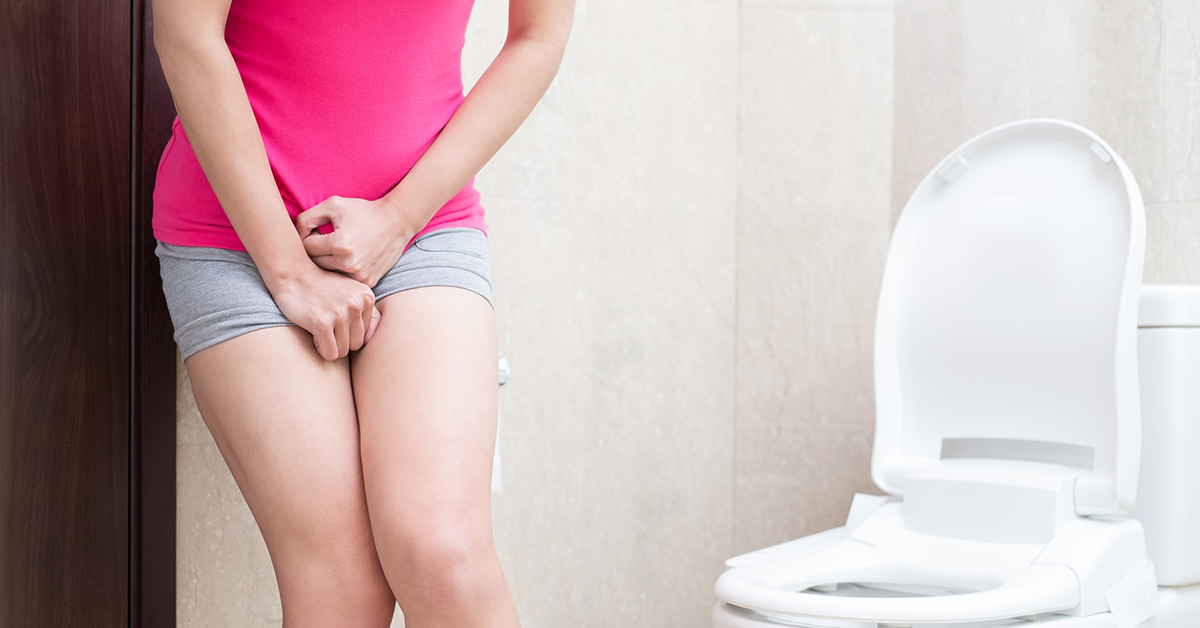 A cough, sneeze, laugh, pee, oops! It’s more than inconvenient, it can cause us to lose our feminine confidence and daily comfort. Having to wear pads so we don’t “have accidents” is the quickest way to feel old.
A cough, sneeze, laugh, pee, oops! It’s more than inconvenient, it can cause us to lose our feminine confidence and daily comfort. Having to wear pads so we don’t “have accidents” is the quickest way to feel old.
Incontinence is the involuntary loss of one’s bladder control. It happens to an estimated 20 million people in the US who are going through menopause, so you’re not alone (not that it makes it any better).
During perimenopause, our vaginal tissue starts becoming thinner and less elastic. I recommend Kegel exercises to strengthen the pelvic floor muscles and to improve symptoms of incontinence.
To learn to improve or heal a leaky bladder, read: 3-Steps To Naturally Reduce Or Even Heal A Leaky Bladder.
I also highly recommend my vaginal cream Julva® with DHEA and Alpine Rose plant stem cells. It is perfect for the delicate tissue of the vulva because it only uses natural ingredients that are 100 percent safe for your body. It not only addresses symptoms like urinary leakage, vaginal dryness or discomfort, but it also helps you reclaim your libido and orgasms. You can try it for free here.
Fatigue and disconnect
 For women going through menopause, experiencing fatigue and disconnect is commonplace. Not only is your body changing, but stress that comes from all that change can wreak havoc on your system.
For women going through menopause, experiencing fatigue and disconnect is commonplace. Not only is your body changing, but stress that comes from all that change can wreak havoc on your system.
The effects of chronic stress and adrenal fatigue can literally empty your tank and throw you off balance. It is very possible that some of the most important hormones in your body — cortisol, adrenaline, and oxytocin — are waging war on each other.
I speak from experience when I say that this is not a great space to be in. Even armed with all of my clinical knowledge of the human body, I felt it was a challenge to get myself out of that isolation. I had to really make a commitment to myself to get better, and eventually, I did.
To learn to overcome fatigue and disconnect, read: This Gland Wreaked Havoc In My Body — Until I Made Two Big Changes.
Brain fog
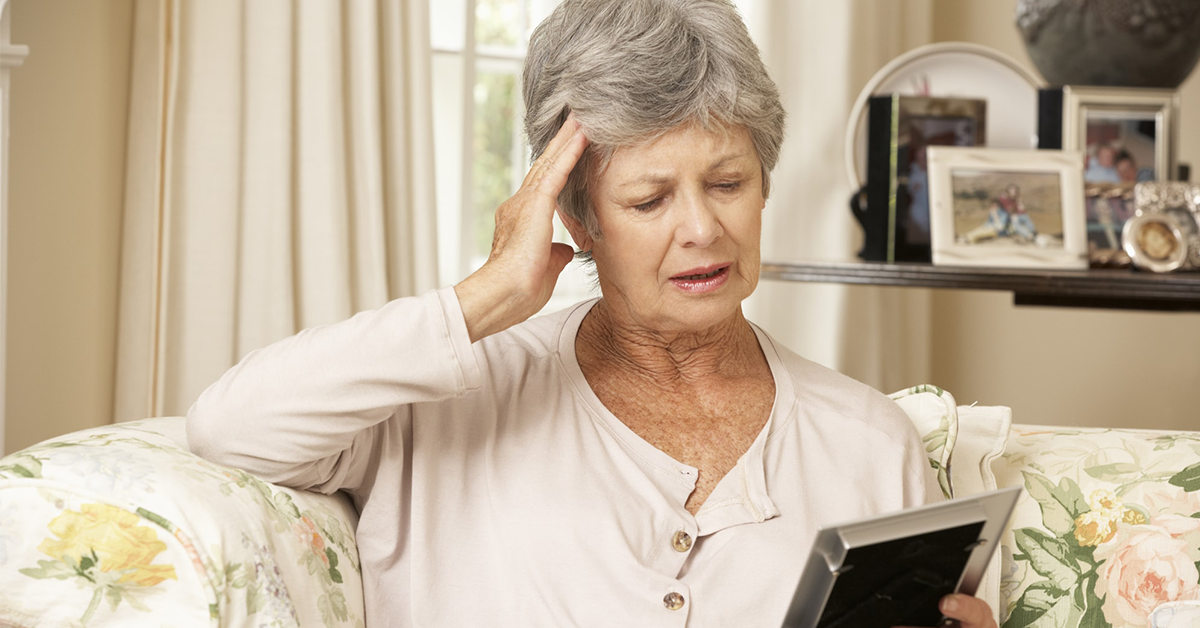 Brain fog and memory loss are also all too common with menopause. No, it is not early Alzheimer’s, but it may be the decline of estrogen. Estrogen is necessary for glycolysis in the brain so declining levels mean declining function. Additionally, feelings of overwhelm affect our thinking, concentration, hormonal balance and even how we adapt to memory.
Brain fog and memory loss are also all too common with menopause. No, it is not early Alzheimer’s, but it may be the decline of estrogen. Estrogen is necessary for glycolysis in the brain so declining levels mean declining function. Additionally, feelings of overwhelm affect our thinking, concentration, hormonal balance and even how we adapt to memory.
I’ve found exercising your mind and practicing meditation to be helpful, along with becoming keto-green.
To learn about overcoming brain fog, read: 5 Natural Ways To Overcome Menopause Brain Fog.
Hormone imbalance
 When your hormones are running amok in your system, it’s hard to feel like yourself. You might feel as if you’re a foreigner in your own body, apologizing to loved ones for snapping at them, feeling guilty, disconnected and lonely.
When your hormones are running amok in your system, it’s hard to feel like yourself. You might feel as if you’re a foreigner in your own body, apologizing to loved ones for snapping at them, feeling guilty, disconnected and lonely.
In fact, one might even say you feel… insane. But rest assured, you’re not going crazy.
Hormone imbalances don’t only affect our moods, but also manifest themselves as different issues in the body.
Headaches, aches and pains, menstrual irregularities, weight gain and bloating, as well as vaginal dryness, weakening pelvic floor muscles, incontinence and decreased arousal all can be caused by an imbalance.
These imbalances also cause mood imbalances, like lowered self-esteem, depression, mood swings, irritability and more.
To learn to balance out your hormones, read: You’re Not Crazy, It’s Just Your Hormones! Get Balanced With These 3 Tips
How to heal or reduce menopausal symptoms
I know, it feels a little bleak, doesn’t it? Hang in there! Menopause doesn’t mean the end of “normal” life. The way I look at it, it’s an opportunity to optimize our habits so we may happily and healthily live the lives we choose.
Most women will experience at least one of the symptoms I’ve mentioned above. Don’t suffer through these symptoms in silence -- especially since some of them won’t go away on their own. Get a game plan. Below are some tried and true methods to fix or reduce menopausal symptoms.
Practice A Keto-Alkaline® Or Keto-Green™ diet
I have written a lot about my keto-alkaline® or keto-green diet and lifestyle and how incorporating the nutrition and lifestyle principles can make a real difference in the quality of our lives.
What’s keto-green?
Keto-green (or keto-alkaline) is about incorporating a diet that strives to keep your urinary pH at an optimal “alkaline” level, which typically sits at 7 or above. A urine pH that is more alkaline than acidic is linked to lower rates of cancer, cardiovascular disease, metabolic syndrome, and other chronic diseases.
It has also been shown to lower inflammation, decrease joint pain, and relieve menstrual discomfort. A urine pH that is more alkaline works to balance your hormones, give you more energy and help you feel better overall.
In my keto-green approach, I encourage low-carb alkaline veggies and discourage eating excessive acid-promoting foods, especially all processed foods, grains, white sugar, white flour, and caffeine.
I encourage healthy protein choices from free-range meats and wild-caught fish. Make sure you have healthy fats incorporated into your diet from sources like ghee, avocados, nuts, olive and coconut oil to keep hormones balanced and to give you much-needed energy.
Add Supplements
I highly recommend adding some supplements to your diet. Remember, our bodies are changing, and what used to work might not be enough anymore.
Some essentials I recommend are:
- A daily dose of about 400–800 IU of vitamin E — this is especially good for relieving hot flashes. It’s important to get a good quality mix of (?) tocopherols and tocotrienols vitamin E.
- Vitamin C
- Magnesium glycinate or magnesium l-threonate
- Methylated B vitamins (Methyl B-Complex)
- High-quality protein shake
- Omega-3s
- Vitamin D.
Get Enough Sleep
Combining a good night’s rest with deep breathing and meditation can really help keep your stress at bay. If you have trouble getting to bed, try these tips below:
Get Enough Movement
Exercise can improve mood and sleep, and reduce stress and anxiety. Exercise triggers the growth of new nerve cells and blood vessels in the brain and increases the production of chemicals that promote the repair of existing brain cells.
Basically, a little bit of daily movement goes a long way! There are a lot of ways to get in a workout, but I’d recommend doing more functional and high-intensity interval training exercises. They appear to boost the size of the hippocampus — the brain area involved in verbal memory and learning.
Exercise Your Brain
While the brain isn’t actually a muscle, you should still exercise it as if it were. The same principle applies, if you don’t work out your brain — just like your muscles — you’ll notice a slow decline in its functions. When I say “work out” your brain, I mean mentally stimulate it so that it stays in shape! In order to exercise the brain, you’ll need to provide it with stimuli that challenge it to “think”.
My two favorite ways of exercising my brain are learning languages and implementing a mindfulness practice. You could also work on learning a new skill, reading a good book, having a stimulating debate, engaging in meaningful conversation and working with numbers.
Include Key Superfoods In Your Diet
There isn’t a set of criteria that defines a superfood. But it’s widely agreed that superfoods are packed with nutrients and can help provide your body with the antioxidants, vitamins, and minerals you need to thrive and feel great.
Superfoods that improve insulin sensitivity are turmeric, cinnamon, and green tea, to name a few. In India, they swear by turmeric — which is great for treating inflammation, promoting brain health and assuaging hot flashes.
Other superfoods include:
- Wheatgrass
- Blueberries
- Almonds
- Kale
- Spirulina
- Acai berries
- Flaxseed
- Maca (my favorite)
 Maca is a root that grows in the Andes in Peru. Peruvian natives use maca to help with fertility, libido, and fatigue. It’s even called the Peruvian Viagra. Research has shown that maca reduces perimenopausal symptoms including hot flashes, anxiety and depression. Maca also works to balance hormones and helps with mood fluctuations.
Maca is a root that grows in the Andes in Peru. Peruvian natives use maca to help with fertility, libido, and fatigue. It’s even called the Peruvian Viagra. Research has shown that maca reduces perimenopausal symptoms including hot flashes, anxiety and depression. Maca also works to balance hormones and helps with mood fluctuations.
Mighty Maca® Plus with 40+ superfood ingredients (including turmeric, flaxseed, cinnamon, extracts of grape seed, green tea, milk thistle, mangosteen, and blueberry) helps to increase stamina, boost energy, fight inflammation and decreases hot flashes. It also assists with mood disorders, PMS and menopause symptoms.
To learn more watch the video below:
On The Other Side
At the end of the day, let’s treat menopause as a natural part of life because it is just that. It’s just another part of our journey as human women. Menopause hits, and you no longer deal with PMS or periods (you’re free!).
These lifestyle changes suggested to work through menopause might seem like a lot in the beginning, but in the long run, these boosts can help you feel better. I’m here to lead you to a better quality of life, overall. Dive into the suggested readings, re-learn your body, and trust these changes. A fresh glow of self-confidence – and freedom -- is waiting on the other side.
I promise.
 What Causes Menopause?
What Causes Menopause? Know Them: Symptoms Of Menopause
Know Them: Symptoms Of Menopause
